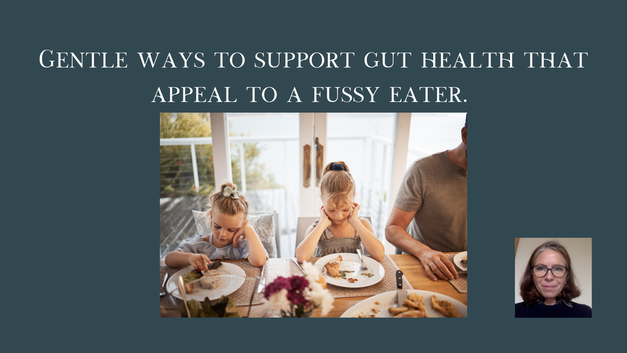ARTICLE Categories
All
|
|
www.facebook.com/groups/417030973601268This weeks’ article comes thanks to one of my members in my Free Facebook group for carers of children with gut and/or skin issues. She asked for exactly what it says in the title. Ideas for gently supporting gut health whilst appealing to a fussy eater.
At first glance it may appear that this article is only aimed at children, but it isn’t. You would be surprised how many adults have quite distinctive likes and dislikes when it comes to food. So, this is a great topic to tackle because it effects so many of us, whether we are a parent of a fussy eater, or whether we aren’t that keen on a few foods ourselves. Last thing before I delve properly into the topic. My belief is that fussy eaters are born and not made and so I want to take any of notion of guilt straight out of the equation. This is the little anecdote that brought me to that conclusion: My first-born loves all food, a lot. As an infant/young child he was never happier than when he was eating, and we were amazed by how adventurous he was, so young. I of course, as a first-time parent, foolishly thought that this had something to do with my parenting skills. As I was soon to find out, my son was born loving food, it had absolutely diddly squat to do with me. My daughter then arrived, and if I was a suspicious sort, I would think that she came specifically to teach me a lesson. Food didn’t interest her. She didn’t like lumps right from the start – baby porridge was a no-no, she just spat it out. She would only eat vegetables that came from tins, and she could outlast my patience at the table, by a considerable mile. She was born suspicious of most foods and there was nothing I could do to change it. Well, I did manage, but it took years. She is part of the reason I retrained as a Registered Nutritional Therapy Practitioner, I needed to know more, so I could feed her better. You’ll be pleased to hear that she now eats an amazing variety of foods and cooks for most of her friends. She still doesn’t like yogurts with ‘bits’, however. Anyway, enough digression. Today’s article is all about which nutrients are helpful to support gut health generally and some tips on how to subtlety incorporate them in the diet so that it slips past the most vigilant of fussy eaters. A quick overview of our digestive system and what it needs for health. Before we get into the nutrients and tips, just a quick overview of the gut. The gut runs all the way from our mouth to our bottom. Digestion starts in the mouth, specifically for carbohydrates (bread, pasta, flour-based products, potatoes etc), once swallowed the food passes via the oesophagus and is drip fed into the stomach. It then passes through into the small intestine, where most digestion of nutrients takes place, before moving into the large intestine where water is removed, and our gut bacteria continues to break down matter and synthesises certain vitamins. We then finally pass what’s left as a stool, and the process is complete. The whole process is managed thanks to peristalsis, a wave like action that helps propel the food to each area of the digestive stages. Many clients talk about gut problems, but that term is a little vague as issues can occur at any of the stages. We may eat too quickly and not chew enough so that the food is too large, and we experience a sensation that the food is hard to digest. We can have issues with our oesophagus so that some of the stomach acid comes up further than it should, and we experience reflux. We can have too much or even too little stomach acid so our foods, most commonly proteins, aren’t adequately broken down. We can have an issue with digestive enzymes or bile acids. Bacteria can come up to the small intestine, where they shouldn’t be and trigger small intestinal bowel overgrowth (SIBO). We can have an unbalanced gut bacteria population and constipation in the large intestine. So which nutrients are good for our digestive system? Here is a list of the nutrients, the tips on how to incorporate them will follow!
How to slip these ingredients into your fussy eater’s diet.
Sign up for my news to receive the published articles straight to your inbox. Read more by clicking below to see my previously published articles:
I’m Jessica Fonteneau, the Eczema and Digestive Health Nutrition Expert. I’ve worked with hundreds of clients to help them change their diets, better manage their flares, and find relief. My vocation is to help those with eczema and digestive issues, because I have suffered with these interlinked conditions since I was 6 months old, and I truly know what it is like to experience these debilitating conditions. Every client I have ever worked with has their own triggers and ideal nutrition. There is no such thing as ‘one-size-fits-all’. Whether you work with me one-to-one or use my guided tools, my objective is to help you uncover what works best for you, so that you take back control and experience relief. My guided programmes are only suitable for adults as children have very specific nutrition requirements. I do, however, work with many child clients as part of my clinic. I also offer two free communities for adults caring for children with eczema and digestive symptoms, feel free to come and join us and get some well-deserved support.
To easily keep up with my articles, masterclasses, ebooks and online programmes and receive exclusive access to early bird offers, sign-up to my newsletter. Interested in what I do and who I am? Go to my website: www.jessicafonteneaunutrition.com
0 Comments
Leave a Reply. |
AuthorI’m Jessica Fonteneau, I’m the eczema specialist and I help people Escape from the Eczema trap. Archives
April 2024
Catégories
All
|


 RSS Feed
RSS Feed